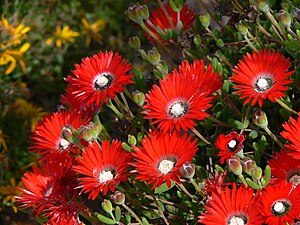Difference between revisions of "Aizoaceae"
Jump to navigation
Jump to search
m (1 revision: all angiosperm families) |
(Start article) |
||
| Line 1: | Line 1: | ||
| − | |||
{{automatic taxobox | {{automatic taxobox | ||
| image = Sesuvium_p.jpg | | image = Sesuvium_p.jpg | ||
| Line 7: | Line 6: | ||
| subdivision = See text | | subdivision = See text | ||
}} | }} | ||
| − | |||
| − | + | '''Aizoaceae''', the ice plant family, contains a few edible plants: | |
| − | |||
| − | |||
| − | |||
| − | |||
| − | |||
| − | |||
| − | |||
| − | |||
| − | |||
| − | |||
| − | |||
| − | |||
| − | |||
| − | |||
* ''[[Carpobrotus edulis]]'' and ''[[Mesembryanthemum crystallinum]]'' have [[List of plants with edible leaves|edible leaves]], and are both commonly called ice plant. | * ''[[Carpobrotus edulis]]'' and ''[[Mesembryanthemum crystallinum]]'' have [[List of plants with edible leaves|edible leaves]], and are both commonly called ice plant. | ||
* A species known as [[New Zealand spinach]] (''Tetragonia tetragonioides'') is grown as a garden plant in somewhat dry climates and used as an alternative to [[spinach]] in upscale [[salad]]s. | * A species known as [[New Zealand spinach]] (''Tetragonia tetragonioides'') is grown as a garden plant in somewhat dry climates and used as an alternative to [[spinach]] in upscale [[salad]]s. | ||
| − | |||
| − | |||
| − | |||
== Genera == | == Genera == | ||
| Line 202: | Line 183: | ||
[[File:Aizoaceae at Marsh Botanical Garden.jpg|thumb|The Desert House at Marsh Botanical Garden.]] | [[File:Aizoaceae at Marsh Botanical Garden.jpg|thumb|The Desert House at Marsh Botanical Garden.]] | ||
| − | == | + | ==References== |
{{Reflist}} | {{Reflist}} | ||
| − | + | {{Ack-Wikipedia}} | |
| − | |||
| − | |||
| − | |||
| − | |||
| − | |||
| − | |||
| − | |||
| − | |||
| − | |||
| − | |||
| − | |||
| − | |||
| − | |||
[[Category:Aizoaceae| ]] | [[Category:Aizoaceae| ]] | ||
[[Category:Caryophyllales families]] | [[Category:Caryophyllales families]] | ||
| − | |||
| − | |||
| − | |||
Revision as of 22:45, 4 June 2017
| Aizoaceae | |
|---|---|

| |
| Sesuvium portulacastrum | |
| Scientific classification | |
| Kingdom: | Plantae |
| Clade: | Angiosperms |
| Clade: | Eudicots |
| Order: | Caryophyllales |
| Family: | Aizoaceae Martinov |
| Genera | |
|
See text | |
Aizoaceae, the ice plant family, contains a few edible plants:
- Carpobrotus edulis and Mesembryanthemum crystallinum have edible leaves, and are both commonly called ice plant.
- A species known as New Zealand spinach (Tetragonia tetragonioides) is grown as a garden plant in somewhat dry climates and used as an alternative to spinach in upscale salads.
Genera
Subfamily Aizooideae
- Acrosanthes Eckl. & Zeyh.
- Aizoanthemum Dinter ex Friedrich
- Aizoon L.
- Galenia L.
- Gunniopsis Pax
- Plinthus Fenzl
- Tetragonia L.[1]
Subfamily Mesembryanthemoideae
|
|
Subfamily Ruschioideae
|
|
|
Subfamily Sesuvioideae
- Cypselea Turpin
- Sesuvium L.
- Trianthema L.
- Tribulocarpus S.Moore
- Zaleya Burm.f.[6]
Incertae sedis
References
- ↑ "GRIN Genera of Aizoaceae subfam. Aizooideae". Germplasm Resources Information Network. Retrieved 2011-03-04.
- ↑ "GRIN Genera of Aizoaceae subfam. Mesembryanthemoideae". Germplasm Resources Information Network. Retrieved 2011-03-04.
- ↑ "GRIN Genera of Aizoaceae tribe Apatesieae". Germplasm Resources Information Network. Retrieved 2011-03-04.
- ↑ "GRIN Genera of Aizoaceae tribe Dorotheantheae". Germplasm Resources Information Network. Retrieved 2011-03-04.
- ↑ "GRIN Genera of Aizoaceae tribe Ruschiae". Germplasm Resources Information Network. Retrieved 2011-03-04.
- ↑ "GRIN Genera of Aizoaceae subfam. Sesuvioideae". Germplasm Resources Information Network. Retrieved 2011-03-04.
Acknowledgements
This article uses material from the Wikipedia article Aizoaceae, which is released under the Creative Commons Attribution-Share-Alike License 3.0.







